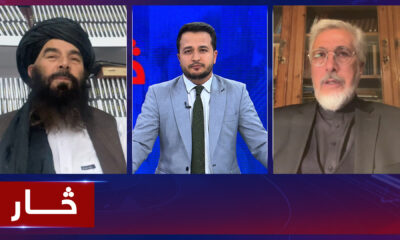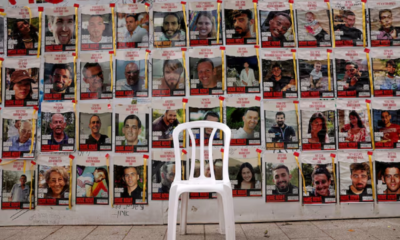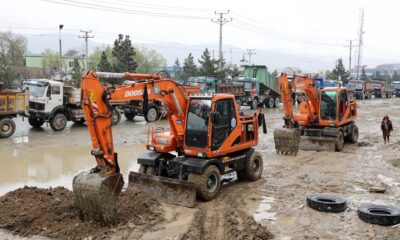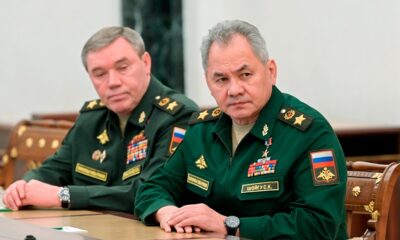Regional
Saudi crown prince meets Iran’s foreign minister as relations thaw

Saudi Arabian Crown Prince Mohammed bin Salman met Iran’s Foreign Minister Hossein Amirabdollahian on Friday in the highest-level talks since the countries reconciled in March after years of bitter rivalry that destabilised the region, Reuters reported.
The unscheduled meeting in Jeddah comes a day after Amirabdollahian arrived in the kingdom and declared ties between the countries were “on the right track” following talks with his Saudi counterpart Prince Faisal bin Farhan.
“Discussions were frank, beneficial and productive,” Amirabdollahian said in a social media post after meeting the de facto Saudi ruler, adding that the countries “agree on the security and development of all in the region”.
Mohammed bin Salman, widely known as MbS, has pushed to reorient Saudi foreign policy in recent years amid troubles in its historically close relationship with the United States.
Footage of the meeting on Iranian state media showed MbS and Amirabdollahian smiling as they spoke, while Prince Faisal and the Iranian delegation looked on. Saudi state news agency SPA said they discussed international and regional developments.
Rivalry between Iran’s revolutionary, Shi’ite Muslim leaders and Saudi Arabia’s Sunni ruling family dominated the Middle East for years as they competed for influence in Iraq, Syria, Lebanon, Yemen and Bahrain amid a wave of sectarian bloodshed.
However, China brokered a rapprochement in March leading to a resumption of full diplomatic relations, which Saudi Arabia had broken off in 2016 when protesters attacked its Tehran embassy over Riyadh’s execution of a prominent Shi’ite cleric.
Prince Faisal visited Tehran in June and said he hoped Iranian President Ebrahim Raisi would visit the kingdom at the “appropriate time”.
After years of competition, and with some of the main regional arenas for their competition more stable than in previous years, both sides have reason to change tack.
Iran’s Supreme Leader Ayatollah Ali Khamenei wanted to end political and economic isolation pushed by the United States and saw new relations with Saudi Arabia as a way to do so, Iranian officials have said.
Saudi Arabia had meanwhile lost confidence in U.S. commitment to shared regional security concerns and wanted to bolster ties with China, which has retained good relations with Iran. This month it succeeded in getting China to attend a diplomatic meeting on Ukraine that Beijing had earlier avoided.
Prince Faisal also spoke by phone with U.S. Secretary General Antony Blinken, with the pair discussing more coordination to boost “security and stability in the Middle East region,” Saudi state media reported on Friday.
Regional
China to host Hamas, Fatah for Palestinian unity talks

China will host Palestinian unity talks between Hamas and its rivals Fatah, the two groups and a Beijing-based diplomat said on Friday, a notable Chinese foray into Palestinian diplomacy amid the war in the Gaza Strip.
Hamas, which controls Gaza, is the group whose fighters stormed into Israeli towns on Oct. 7, killing 1,200 people and capturing 253 hostages. Israel has sworn to annihilate Hamas in an onslaught that has killed more than 34,000 Palestinians.
Fatah is the movement of Mahmoud Abbas, president of the Western-backed Palestinian Authority, which exercises limited self-rule in the Israeli occupied West Bank.
The two rival Palestinian factions have failed to heal their political disputes since Hamas fighters expelled Fatah from Gaza in a short war in 2007. Washington is wary of moves to reconcile the two groups, as it supports the PA but has banned Hamas as terrorists.
A Fatah official told Reuters a delegation, led by the group’s senior official Azzam Al-Ahmed, had left for China. A Hamas official said the faction’s team for the talks, led by senior Hamas official Moussa Abu Marzouk, would be flying there later on Friday.
“We support strengthening the authority of the Palestinian National Authority, and support all Palestinian factions in achieving reconciliation and increasing solidarity through dialogue and consultation,” said Chinese Foreign Ministry spokesperson Wang Wenbin at a regular briefing on Friday, without confirming the meeting.
The visit will be the first time a Hamas delegation is publicly known to have gone to China since the start of the war in Gaza. A Chinese diplomat, Wang Kejian, met Hamas chief Ismail Haniyeh in Qatar last month, according to the Chinese foreign ministry.
The Beijing-based diplomat, who had been briefed on the matter, said the talks aimed to support efforts to reconcile the two Palestinian rival groups.
China has lately demonstrated growing diplomatic influence in the Middle East, where it enjoys strong ties with Arab nations and Iran. Last year, Beijing brokered a breakthrough peace deal between longstanding regional foes Saudi Arabia and Iran.
U.S. Secretary of State Antony Blinken said he discussed with Chinese President Xi Jinping and other officials in Beijing on Friday how China can play a constructive role in global crises, including the Middle East.
Chinese officials have ramped up advocacy for the Palestinians in international forums in recent months, calling for a larger-scale Israeli-Palestinian peace conference and a specific timetable to implement a two-state solution.
In February, Beijing urged the International Court of Justice (ICJ) to give its opinion on the Israeli occupation of the Palestinian Territories, which it said was illegal.
More recently, China has been pushing for Palestine to join the United Nations, which Beijing’s top diplomat Wang Yi said last week would “rectify a prolonged historical injustice”.
(Reuters)
Regional
New UK sanctions target Iranian drone industry

Britain on Thursday announced new sanctions targeting Iran’s military drone industry, in response to Iran’s drone and missile attack on Israel earlier this month.
The measures, taken in co-ordination with the U.S. and Canada, target four businesses and two directors at a network of drone companies with the aim of limiting Iran’s ability to launch drones.
“The Iranian regime’s dangerous attack on Israel risked thousands of civilian casualties and wider escalation in the region,” British Foreign Secretary David Cameron said in a statement.
“Today the UK and our partners have sent a clear message – we will hold those responsible for Iran’s destabilising behaviour to account.”
Britain also said it would introduce new bans on the export of drone and missile components to Iran, seeking to limit its military capabilities.
Last week, Britain imposed sanctions on Iranian military figures and organisations, in another coordinated move with the United States, following Iran’s action against Israel.
Iran launched drones and fired missiles at Israel on April 13 as a retaliatory strike for the attack on its embassy compound in Damascus two weeks prior, raising the risk of further escalation in conflict in the Middle East.
(Reuters)
Regional
Turkey accuses U.S. of double standards over Gaza in rights report
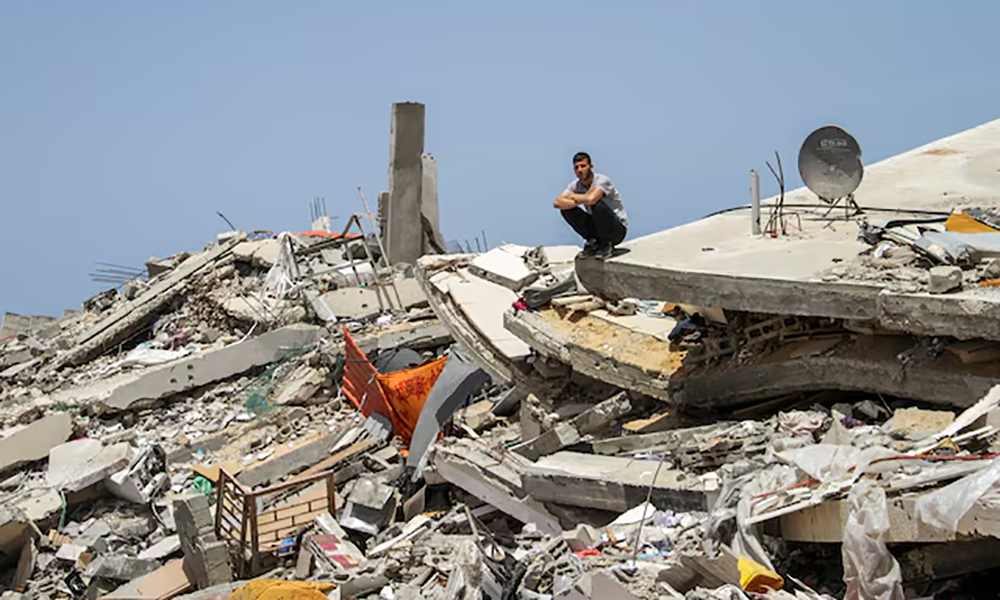
Turkey on Wednesday accused the United States of having a policy of double standards on human rights, saying Washington’s annual rights report failed to reflect Israel’s assaults in Gaza, Reuters reported.
Turkey’s foreign ministry said in a statement it was deeply concerned that the U.S. report did not “duly reflect the ongoing inhumane attacks in Gaza”.
The report was prepared with “political motives, far from impartiality and objectivity”, it said, calling on Washington to cease its “double-standard policy on human rights”.
It also cited U.S. ties with the Syrian Kurdish YPG militia which Ankara deems a terrorist organisation.
Israeli forces have killed more than 34,000 Palestinians in Gaza, according to health authorities there, many of them civilians and children. The enclave has been reduced to a wasteland and extreme food shortages have prompted fears of famine.
Israel launched its assault in response to an attack by the Hamas militant group on Oct. 7 in which Israel says 1,200 people were killed. It denies allegations of deliberately causing humanitarian suffering and targeting civilians.
Turkey has denounced Israel for its campaign in Gaza and called for a ceasefire. It has also criticised Western countries for what it calls their unconditional support of Israel, read the report.
In its report, the U.S. State Department said Israel’s war against Hamas had a “significant negative impact” on the human rights situation in Israel.
On Monday, U.S. Secretary of State AntZony Blinken rejected suggestions that Washington might have double standards over Israel’s record.
-

 Latest News4 days ago
Latest News4 days agoRashid Khan named AWCC’s brand ambassador
-

 World4 days ago
World4 days agoMalaysian navy helicopters collide in mid-air, 10 killed
-

 Sport4 days ago
Sport4 days agoJaiswal ton powers Rajasthan to big IPL win
-

 World4 days ago
World4 days agoNorth Korea officials visit Iran in a rare public trip
-

 Latest News5 days ago
Latest News5 days agoAt least 1,500 families affected by recent floods: IRW
-

 Sport4 days ago
Sport4 days agoMawj Sahil player scores stunning halfway line goal in 1-0 win over Jawanan Wahedi
-

 Sport3 days ago
Sport3 days ago‘Serious talent’ Fraser-McGurk bonds with Warner to light up IPL
-

 Latest News4 days ago
Latest News4 days agoUS report cites ‘significant deterioration’ in Afghan women’s rights last year


